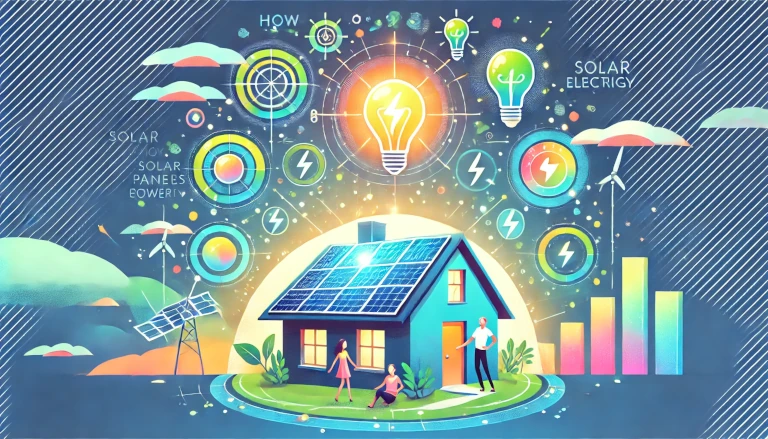Solar panels are becoming a popular choice in India for harnessing renewable energy from the sun, providing clean power for homes, businesses, and off-grid systems. But why should you consider solar panels? How do they work, and are they worth the investment? This guide covers everything you need to know about solar panels, including their advantages, disadvantages, cost benefits, and tips on choosing the right system for your needs in India.
What are Solar Panels? 🤔
Solar panels are devices that convert sunlight directly into electricity. They consist of photovoltaic (PV) cells that capture sunlight and generate direct current (DC) electricity. The electricity is then converted into alternating current (AC) through an inverter, making it suitable for use in your home or business.
How Do Solar Panels Work? 🌞🔋
Here’s a simple breakdown of how solar panels work:
- Sunlight Absorption: Solar cells absorb sunlight and generate DC electricity.
- Inverter Conversion: The DC electricity is sent to an inverter, which converts it to AC power.
- Power Usage or Storage: The AC electricity can power your home or be stored in a battery for later use.
Solar panels can provide power as long as they receive sunlight, making them a reliable and sustainable energy source for various applications.
Why Choose Solar Panels? 🌍
There are numerous reasons why solar panels are a wise choice:
- Eco-Friendly Energy: Solar panels produce clean, renewable energy, helping reduce greenhouse gas emissions.
- Cost Savings on Electricity Bills: By generating your electricity, you can lower or even eliminate your energy bills.
- Energy Independence: Solar panels offer a degree of independence from the grid, especially during power outages.
- Increased Property Value: Homes with solar panels often have a higher resale value due to lower utility costs.
Where Can You Use Solar Panels? 🏡🏢
Solar panels can be installed in a variety of settings:
- Residential Homes: Perfect for reducing home energy bills and relying less on grid power.
- Commercial Buildings: Businesses can cut operational costs and improve sustainability with solar power.
- Off-Grid Applications: Solar panels can power remote cabins, boats, and RVs without access to the grid.
What are the Advantages and Disadvantages of Solar Panels? 📊
Advantages:
- Renewable Energy Source: Solar panels use the sun, a renewable resource, which is sustainable and available almost everywhere.
- Low Operating Costs: Once installed, solar panels require minimal maintenance and have low operating costs.
- Long Lifespan: Solar panels typically last 25 years or more, providing a long-term energy solution.
Disadvantages:
- High Initial Cost: The upfront cost of purchasing and installing solar panels can be high, though costs have been decreasing in recent years.
- Weather Dependent: Solar panels are less effective on cloudy days and generate no power at night.
- Space Requirements: Large solar panel systems require significant roof or ground space, which may not be available for all properties.
How Much Do Solar Panels Cost in India? 💸
The cost of solar panels in India varies based on system size, location, and installation fees. On average, residential solar panel systems can range from ₹1,50,000 to ₹5,00,000 before government subsidies. However, there are various subsidies and incentives available that can significantly reduce these costs.
For example, a typical 3-kilowatt residential system costs around ₹1,80,000 before subsidies. Depending on your energy needs, you might recoup these costs within 5 to 10 years through electricity bill savings.
What Are the Cost Benefits of Solar Panels? 🏷️
Solar panels offer several cost benefits:
- Savings on Energy Bills: Solar panels allow you to produce your own electricity, potentially eliminating your utility costs.
- Subsidies and Rebates: Many areas in India offer subsidies to reduce the cost of installing solar panels.
- Return on Investment (ROI): While there is an initial cost, solar panels typically pay for themselves over time due to energy savings.
For instance, a homeowner who pays ₹10,000 monthly for electricity can save ₹1,20,000 annually. With a 25-year lifespan, the savings add up significantly over time.
When is the Best Time to Install Solar Panels? 🕒
Solar panels can be installed year-round, but the best time often depends on local weather and incentive programs. For instance, installing solar panels before the summer season allows you to maximize energy production during the sunniest months.
How to Choose the Best Solar Panels for Your Needs 📋
When selecting solar panels, consider the following factors:
- Efficiency Ratings: Higher efficiency panels convert more sunlight into electricity, maximizing your energy production.
- Warranties and Lifespan: Look for panels with long warranties (20-25 years) and reputable brands.
- Installation and Maintenance Costs: Research local installers and get quotes to find the best balance between cost and quality.
- Energy Needs: Determine your electricity usage and choose a system size that meets your energy demands.
Solar panels are an excellent choice for anyone in India looking to reduce their environmental impact and save on electricity costs. While they require an initial investment, the long-term benefits make them worthwhile. With advancements in technology and decreasing costs, solar energy has become more accessible than ever, providing clean and sustainable power for homes and businesses alike.
Discover more from Green Ecosystem - Renewable Energy, Agriculture, and Environmental Sustainability
Subscribe to get the latest posts sent to your email.


